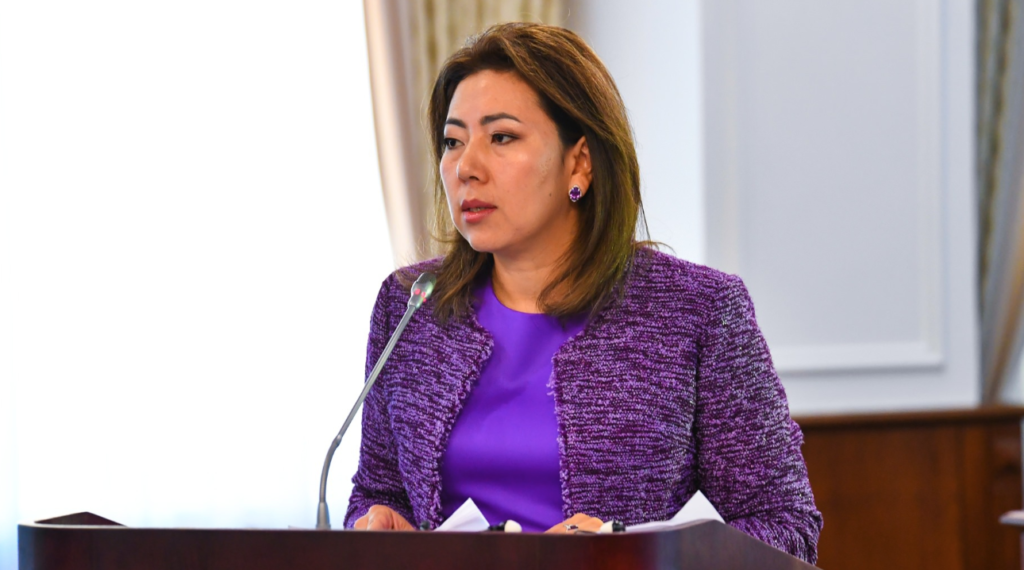ASTANA – The Kazakh government will present a new national plan by the end of the year to ensure the rights and improve the quality of life for people with disabilities, as the previous plan adopted in 2016 will expire this year. The new plan has seven priority areas, said Minister of Labour and Social Protection Madina Abylkassymova at an Oct. 9 government meeting.

Kazakh Minister of Labour and Social Protection Madina Abylkassymova. Photo credit: primeminister.kz
More than one billion people, or 15 percent of the world’s population, live with some form of disability. As of September, the number of Kazakh individuals is 674,200, a 7.5-percent increase compared to 627,200 in 2014, she said.
The document will incorporate standards stipulated in the UN Convention on the Rights of People with Disabilities, which the country ratified in 2015, and include recommendations from Catalina Devandas, UN Special Rapporteur on the Rights of Persons with Disabilities, who visited Kazakhstan in September 2017.
In her statement, she noted Kazakhstan’s commitment to advancing the rights of people with challenges, yet recognised the need for further steps and urged the government to bring its national legislation on legal capacity and mental health into compliance with international human rights standards.
“Kazakhstan needs to move fast in establishing a comprehensive deinstitutionalisation reform to phase out institutional care and facilitate the transition to living in communities,” said Devandas.
The plan’s first area involves measures to prevent disabilities. The leading causes are blood circulatory system disorders, cancer and different kinds of trauma.
“Child disability remains one of the most pressing problems that tends to grow. The main reasons are congenital anomalies, nervous system disorders and mental health problems. In this regard, the Health Ministry should ensure preventive activities and measures of health organisation in family planning, prenatal care and development of rehabilitation medicine,” said Abylkassymova.
Inclusive education was identified as the second priority area. Approximately 12.6 percent of Kazakh children with disabilities do not have access to support and are home-schooled and Devandas noted the country’s efforts to include them in the educational system are “still at a pilot stage and need to be scaled up.”
“Home schooling should be an exceptional and temporary measure to support children whose health does not allow them to attend school, rather than a practice to further segregate children with disabilities,” she said.
Ministry data indicates more than 147,000 children have limited learning opportunities. Abylkassymova noted the education programme for 2016-2019 would provide inclusive education in 30 percent of the country’s preschools, 70 percent of schools and 40 percent of technical and professional education institutes, though she did not specify the conditions.
“At present, 15 percent of all kindergartens and 55 percent of schools have conditions for inclusive education, where more than 40,000 kids with special learning needs study,” the minister said.
“Special rapporteur Catalina Devandas said that 10,000 children with disabilities who are registered in schools in fact are home schooled and do not attend school,” she added.
The third priority area outlines the conditions needed for barrier-free living.
“At present, 32,600 social infrastructure objects are identified and need to be certified to form a barrier-free environment for people with disabilities. Of those, 32,000 objects are subject to certification and 21,100 objects need to be adapted. So far, certification has been conducted on 31,500 objects and adaptation on 19,500 objects,” said Abylkassymova.
Transport infrastructure facilities, including rail stations, airports, public transport, tourism, culture and sports facilities still provide limited access to people with disabilities, she added.
Minister for Investments and Development Zhenis Kassymbek, whose ministry oversees transport infrastructure, noted reconstruction is underway at Karaganda’s rail stations and the design and estimate phases have begun for those in Almaty, Astana and Shymkent.
“In the next five years, in its capital investments plan Kazakhstan Temir Zholy [national railway company] plans to reconstruct and build 71 rail stations and repair passenger platforms at 263 rail stations,” he said.
“Since 2012, for example, Nursultan Nazarbayev International Airport has agents who provide services to passengers with special needs. At present, there are 17 such agents at the airport,” he added.
The fourth area seeks to foster economic independence.
“At present, among 417,700 people with disabilities of working age, more than 30 percent or 127,100 people are working. As of Oct. 1, 15,900 people sought services from employment centres and of those, 6,400 were employed, 1,300 people attended short term courses and 39 persons received microloans to open businesses,” said Abylkassymova.
This year, the national budget allocated 105.6 million tenge (US$283,261) to create 770 jobs for people with disabilities. Executing this measure is lagging and ineffective, she noted, and the new national plan will revise employer quotas and subsidy mechanisms.
“Within the eight months of 2018, only 88 workplaces were created, corresponding to 11.4 percent of the plan and worth 24.1 million tenge (US$64,645). In the third quarter, 2,600 people were employed as part of the fixed quota of jobs for people with disabilities,” she added.
The fifth priority area is intended to make social rehabilitation more efficient.
“Local bodies need to ensure allocation of funds from local budgets, taking into account the real needs of people with disabilities in technical means and rehabilitation services,” said Abylkassymova.
The sixth area includes measures to modernise the social service system; the seventh includes measures for conducting comprehensive information and activities to raise awareness.
